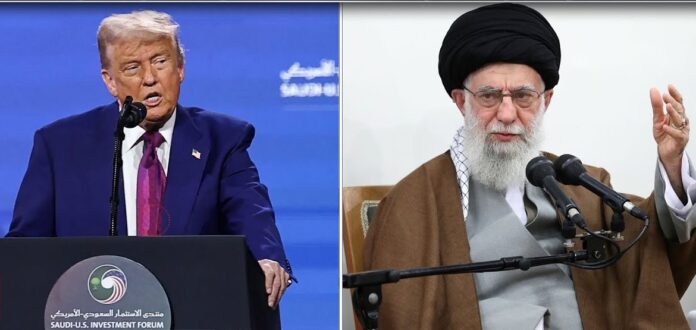Trump warns Iran in stark Riyadh speech, slams Tehran as destabilising force in Middle East
Standing before Gulf business leaders in Riyadh, U.S. President Donald Trump delivered a blistering warning to Iran, branding it the “most destructive force” in the Middle East and vowing that America would never allow Tehran to acquire a nuclear weapon.
The speech, delivered at the Saudi-U.S. Investment Forum on Tuesday, was equal parts threat and olive branch. Trump accused Iran of fuelling chaos across the region—from Syria to Yemen—and warned the Islamic Republic that it stood at a crossroads: “Embrace peace or face the consequences.”
“Iran has a choice,” Trump told the packed forum. “It can continue its campaign of chaos and terror—or it can step back from the brink and become a part of a peaceful and prosperous Middle East.”
“But make no mistake,” he added, his voice hardening. “Iran will never be allowed to acquire a nuclear weapon—not on my watch, not ever.”
The high-stakes message came just hours after Trump stunned the world by announcing the lifting of U.S. sanctions on Syria and sealing a mammoth $600 billion investment deal with Saudi Arabia. While that move drew mixed reactions globally, his Iran remarks landed with forceful clarity, drawing cheers in the Riyadh hall and raising tensions with Tehran.
For Trump, now that he is deep into his third presidential bid, the Middle East has become a familiar stage. The remarks were delivered with the same blunt, deal-making bravado that marked his first term, blending economic carrots with geopolitical sticks.
Though he did not announce any new sanctions, his tone signalled the return of the “maximum pressure” doctrine that defined his previous approach to Iran. The promise was simple: cooperate and be welcomed into a regional economic renaissance—or defy and suffer.
“We have the momentum, the allies, and the will,” Trump said. “We’re investing in peace, but we’re prepared for confrontation.”
The former president’s comments come as Iran continues to enrich uranium beyond limits set in the 2015 nuclear deal, which Trump famously withdrew from in 2018. Since then, tensions have simmered, with occasional flare-ups across the Gulf, Iraq, and Syria.
This time, however, Trump added a sliver of diplomatic nuance. While he condemned Iran’s current path, he also extended what he called a “final opportunity” for dialogue.
“The door isn’t shut. If Iran wants a seat at the table, we’ll pull up a chair. But they have to leave their weapons and war behind,” he said.
Tehran has yet to officially respond, but analysts expect a cold reception, especially in light of the new U.S.-Saudi investment pact, which includes major defence cooperation likely to be viewed as provocative by Iran.
Some observers noted that Trump’s fiery rhetoric could complicate any future attempts at negotiation, especially with hardliners gaining influence in Iran’s political establishment.
But others see a calculated play—pressure Tehran, consolidate ties with Gulf allies, and frame Trump as the only candidate who can dominate the world stage.
His decision to skip a visit to Israel during this Middle East swing also raised eyebrows, suggesting a pivot toward Gulf capital over old regional entanglements.
Back in Riyadh, Trump’s audience of Saudi investors and officials appeared energised. The forum buzzed with talk of the $600 billion in U.S.-bound funds and a new chapter of Saudi-American alignment.
As Trump left the stage, a few words lingered like a warning flare over the Gulf: “Iran has a choice. But we’re done waiting.”
